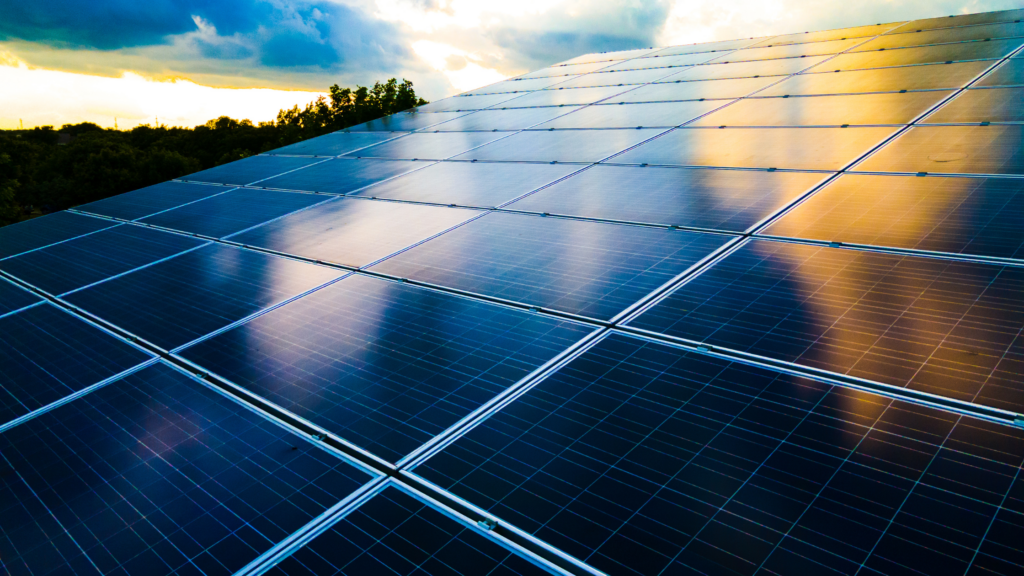After a dip in demand during the pandemic, fossil fuels are seeing resurgent interest worldwide — and traditional energy companies are realizing record profits. These developments have caused some people to question whether investors committed to supporting the clean-energy transition can still do so and make money while making an impact. Our response? There are many great reasons to stay the course with impact investing – including potential returns.
Impact investing — which provides vital support to clean energy companies — can be a valuable way for socially conscious investors to build their portfolios. While our current drive to decarbonize began with the Paris Agreement of 2015¹— which set specific national targets to get greenhouse gas emissions down (and keep global warming below 2C) — the idea of a clean energy transition is nothing new. In fact, it dates back to the 1970s², when a sudden shortage of oil and gas — first in 1973 (the Yom Kippur War), then 1979 (the Iranian Revolution) — forced western nations to pursue energy efficiency standards and find alternative forms of fuel.
We’ve had several ups and downs on this winding road to a clean-energy future, and in 2022, the world once again found itself at a crossroads. When Russia invaded Ukraine, far-reaching sanctions on Russian crude oil³ and natural gas⁴ immediately drove up prices⁵. Many countries (especially in Europe) had to seek out new suppliers; some, like Germany, even had to restart coal-fired power plants⁶ to generate electricity.
While in the short term fossil fuel producers have benefited — both Shell and Exxon reported record profits⁷ in 2022— volatile energy markets are also sparking renewed interest in renewables and energy efficiency, just like in the 1970s. And it is putting impact investing back in the spotlight.
The Case for Impact Investing
Impact investing, at its most basic level, is focused on companies that are having a measurable impact on building a better world, environmentally and/or socially. At Genus, we measure impact investments based on the percentage of revenues being generated from a company’s products or services that contribute to the global sustainable development goals (SDGs) defined by the UN’s 2030 Agenda for Sustainable Development⁸.
Our portfolio managers are constantly looking for ways to improve our portfolios’ net impact scores⁹ — making sure that positive impacts outweigh any negative ones. Sometimes, at least in the short term, those SDGs come into conflict with current market realities. Yet while fossil fuel producers experienced a boost in the wake of Russia’s war on Ukraine, experts say that the clean energy transition continues apace.
“If you’re looking at pure solar companies, or companies that create parts for solar or other renewables, like wind energy, they have tended to do quite well recently,” says Mike Thiessen, Chief Sustainability Officer at Genus. “We had one in our Impact Fund called SMA Solar¹⁰, and it returned 79% (in Euros) last calendar year. The world, especially European countries, is searching for energy independence.”

Good News for Clean Energy
Thiessen notes that recent legislation in the United States is also poised to boost fortunes for clean-energy companies: “There were a lot of subsidies launched around renewables through the Inflation Reduction Act, and that definitely helped boost demand and raise prospects for these companies.”
The Inflation Reduction Act, signed into law last August, provides $370 billion in public investments¹¹ to lower energy costs and accelerate private investment in clean energy solutions. In response, the European Union introduced its own Green Deal Industrial Plan this February, adding hundreds of billions¹² of loans and subsidies for green-tech development.
While impact investors can profit from some of these companies via public markets, the reality is that much of the impact is happening on a smaller scale — and in private markets. According to estimates from The Global Impact Investing Network (GIIN)¹³, an international think tank, the private impact market grew to approximately $1.2 trillion by the end of 2021 — up 63% in just two years’ time.
Genus offers a wide range of options for impact investors¹⁴ in both public and private markets. “We invest in private equity and venture capital, real estate, private debt — all focused around impact,” says Thiessen.
Customized Portfolios for a Complex World
Within the basket of potential impact investments, the reality is that each investor will have a different set of priorities. Some will align with the UN Sustainable Development Goals¹⁵ and want to prioritize global poverty and hunger; others will want to boost gender equality; yet others will want to focus on clean water or education. The key to effective impact investing is customizing a portfolio to meet an individual’s needs.
“We have over 5,000 different factors that we can turn on or off, depending on the client,” says Thiessen. When it comes to energy, for instance, screens might include whether nuclear — a controversial zero-carbon option — is considered: “We can look at the percentage of revenue a company is making off of nuclear power — if a client believes that’s the way to save the planet.”
There remain a lot of “unknown unknowns” in 2023 — but the demand for impact investing will continue to grow, says Thiessen, as both Europe and North America spend heavily on a clean energy transition. Last year (2022), he notes, Genus’ high-impact equity fund¹⁶ beat the benchmark (MSCI World) by almost 10%.
“There’s going to be a lot of demand for renewable energy, as well as energy efficiency. And given the continued need in the world, and with the subsidies starting to roll out, I think we’ll see some very positive results for these companies.”
Interested in wealth management guidance on making an impact with your portfolio? We invite you to talk to a Genus Advisor.
References
[1] (no date) Unfccc.int. Available at: https://unfccc.int/process-and-meetings/the-paris-agreement (Accessed: February 16, 2023).
[2] 1, A. (2022) The geopolitics of energy: The 1970s oil crisis, Epicenter. Available at: https://epicenter.wcfia.harvard.edu/blog/geopolitics-energy-1970s-oil-crisis (Accessed: March 3, 2023).
[3] Amaro, S. (2022) Russian oil sanctions are about to kick in. and they could disrupt markets in a big way, CNBC. CNBC. Available at: https://www.cnbc.com/2022/12/01/russian-oil-sanctions-are-about-to-kick-in-and-they-could-disrupt-markets-in-a-big-way.html (Accessed: February 16, 2023).
[4] McGrath, M. (2022) Climate change: Eu unveils plan to end reliance on Russian Gas, BBC News. BBC. Available at: https://www.bbc.com/news/science-environment-60664799 (Accessed: February 16, 2023).
[5] How are sanctions against Russia impacting oil and gas prices?: Energy outlook: J.P. Morgan (no date) How are sanctions against Russia impacting oil and gas prices? | Energy Outlook | J.P. Morgan. Available at: https://www.jpmorgan.com/insights/research/oil-gas-energy-prices (Accessed: February 16, 2023).
[6] Germany to reactivate coal power plants as Russia curbs gas flow (2022) The Guardian. Guardian News and Media. Available at: https://www.theguardian.com/world/2022/jul/08/germany-reactivate-coal-power-plants-russia-curbs-gas-flow (Accessed: February 16, 2023).
[7] Reed, S. (2023) Shell’s profit soared to $42 billion last year, The New York Times. The New York Times. Available at: https://www.nytimes.com/2023/02/02/business/shell-earnings-record-profit.html?unlocked_article_code=AAAAAAAAAAAAAAAACEIPuonUktbfqIhkSlUbASbfQMMmqBCdnr_UwLE4gjrzJTKTSDBN1KEPDoOH4UuIfbBkadovmTSHQdsLeJkeeMtP9M4NdUp8V1vv5ZKehJUOJyhy946_Umlv05-IAuBn_Xq3NGPobbZzleX67xjdbjW5WPHc1SZyNx8l9cU-DSyi0HEIwK_DEeRniJIpjbp6WMcMFXpXbzKKvvLpFxx-JNyGCxnb4QI0UOpcMirByZ_es_lTNVUPVi-VCS938m0-69lDOdgIPKmZLxIoe8P2grR5GXVjYgBpEIigH8wot5euPqHY&smid=nytcore-ios-share&referringSource=articleShare (Accessed: February 16, 2023).
[8] The 17 goals | sustainable development (no date) United Nations. United Nations. Available at: https://sdgs.un.org/goals (Accessed: February 16, 2023).
[9] Ferraz, C. (2021) Do you know your investment portfolio’s net impact? we do. and here’s why you should, too, Genus. Available at: https://genuscap.com/do-you-know-your-investment-portfolios-net-impact/ (Accessed: February 16, 2023).
[10] SMA Solar Technology AG – Inverter & Photovoltaics Solutions (no date) German. Available at: https://www.sma.de/en/ (Accessed: February 16, 2023).
[11] Inflation reduction act guidebook – clean energy (2023) The White House. The United States Government. Available at: https://www.whitehouse.gov/cleanenergy/inflation-reduction-act-guidebook/ (Accessed: February 16, 2023).
[12] Person (2023) Factbox: What’s in the EU Green Deal Industrial Plan?, Reuters. Thomson Reuters. Available at: https://www.reuters.com/business/sustainable-business/whats-eu-green-deal-industrial-plan-2023-02-01/ (Accessed: February 16, 2023).
[13] Laker, B. (2023) Demand for impact investing is rising. here’s why, Forbes. Forbes Magazine. Available at: https://www.forbes.com/sites/benjaminlaker/2022/11/17/demand-for-impact-investing-is-rising-heres-why/?sh=643deb75285f (Accessed: February 16, 2023).
[14] Genus Webinar – Sustainable spotlight (2022) YouTube. YouTube. Available at: https://www.youtube.com/watch?v=l0hgTP1HjbY (Accessed: February 16, 2023).
[15] Genus. (2022) How our impact portfolios align with the United Nations’ Sustainable Development Goals, Genus. Available at: https://genuscap.com/how-our-impact-portfolios-align-with-un-sdgs/ (Accessed: February 16, 2023).
[16] Impact investing (2022) Genus. Available at: https://genuscap.com/fossil-free-impact/impact-investing/ (Accessed: February 16, 2023).











